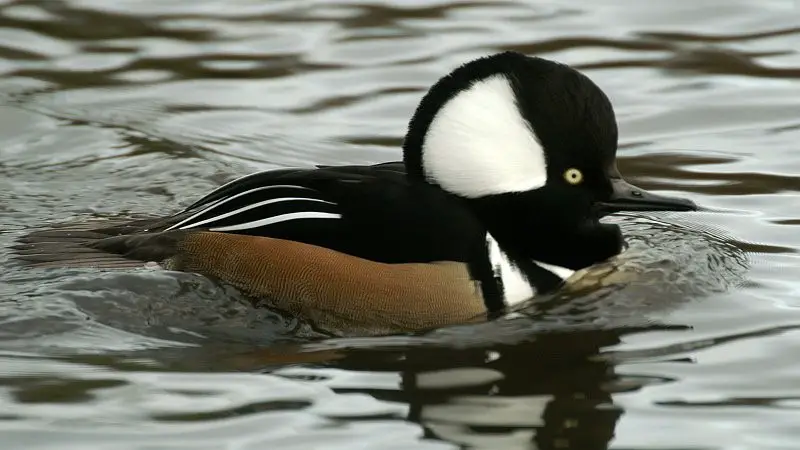I see Ducks all the time, they certainly like to eat duck seed provided by casual visitors around the nature reserve I visit. I see them much of the time on the water too as they ‘ducking’ down into the water searching for stuff …something to eat I guess …but what?
Yes! what!? are they searching for Fish? Let’s explore this further. Here’s the quick take away answer…
Do Ducks Eat Fish? Yes, ducks do eat fish. Ducks are omnivorous birds, who eat a wide variety of food for nourishment and health. A duck’s diet actually consists of mostly small fish. Ducks consume not only fish but also their eggs. Diving ducks feed deeper in the water and typically eat more fish or crustaceans.
In fact, some species of duck such as mergansers with narrow, toothed bills, primarily eat fish. Just about all species of Ducks will include fish as part of their normal diet.
Birds float in water most of the time and being omnivorous, ducks constantly forage for small meals and snacks and can eat just about anything that fits into their mouth. Since ducks spend the majority of their time in the water, they eat a plethora of aquatic creatures.
How big a fish can a duck catch?
the size of the fish that a duck can sensibly eat of course depends on the size of the Duck. This means that smaller ducks such as mallards are limited to small fish like guppies, graylings, and minnows.
Larger Ducks are able to catch larger fish like brown trout and chub. Remember, a duck is unable to cut sufficiently through its prey so it will need to swallow whole, but a Duck will know the size of the prey it can efficiently catch and eat.
What else can Ducks eat?
Here’s a list of the types of things that most Duck varieties can safely eat…
- Fish
- Seeds
- Nuts
- Seaweed
- Algae
- Aquatic plants.
- Insects (even bees)
- Worms
- Snails
- Lizards
- Newts
- Frogs (and Tadpole)
- Small Crabs
- Other small crustaceans
- Grapes
- Bananas
- Plums
- Watermelon
- Pears
- Peaches
- Pumpkin
- Rice (Cooked/Uncooked)
So, yes, Ducks do eat fish. Although ducks can eat almost anything, their diet depends on the type of species, habitat, seasons and their feeding style.
For ducks, fish satisfy their protein and acid requirements which they need for healthy growth, strength, development of muscles, successful breeding and more.
Diving ducks eat more fish than dabbling ducks. They dive down and swim in the water to chase fish and frogs. Wild ducks as well as domestic ducks like Pekins and Cayuga, love to eat fish and other small aquatic animals and plants.
Mergansers are streamlined ducks that float gracefully on the water. They’re the only types of ducks that eat fish regularly and not just a little bit but a large amount of fish every day. They have narrow shaped bills that contain teeth. This type of bill makes it easier for the mergansers to eat fish.
Species of mergansers duck include hooded duck, common mergansers duck, and red-breasted mergansers. The males generally have clean white bodies, dark green heads, and slender red bills.

Female mergansers are elegant with gray bodies, the short crest on cinnamon heads. Common mergansers mostly eat fish along with other aquatic invertebrates such as mollusks and crustaceans. Mergansers dive into deeper waters where fish are schooling, to hunt for food.
During winter, they’re heavy feeding on fish continues. Feeding on fish including salmon, trout, eels, suckers, sculpin, shad, sunfish, chub, minnows, sticklebacks and more.
The young ones eat mostly invertebrates for the first 12 days. After about 12 days they switch to eating fish just like parent ducks. Other species of ducks that eat fish are Muscovy ducks, diving ducks and more.
Wild Ducks
Wild ducks survive in the wilderness and are found mainly living near water sources. Wild ducks eat fish, worms, and frogs found in or around water. Diving ducks like to include more fish in their diet, so they travel deep into the water to catch their meals.
Fish is low-fat and high-quality protein which is rich in omega 3 fatty acids and many other proteins, minerals, and vitamins. Since fish are full of beneficial proteins vitamins and minerals, they provide energy which lasts a long time. The high calcium content also helps female ducks to lay eggs with a stronger shell.
Here are some other Duck related fish-eating questions
Do ducks catch fish?
Yes, Ducks are good at catching fish, provided the fish is within reach of its neck and its bill, then a duck will be fast enough to catch the fish. Of course, the fish has to be a reasonable size that the Duck can cope with.
Do ducks eat mosquitofish?
Yes is the short answer to this, so if you have Mosquito Fish introduced into your pond or pool, then be sure not to let Ducks into your yard.
Do ducks eat fish in a pond?
Absolutely ducks do eat fish kept in Ponds. In fact, as lovely as it might sound having ducks in and around your pond, they can often bring diseases with them, not to mention lots of pollutants of your pond water. Use netting to discourage Ducks from entering your Pond.
What type of fish do mallard ducks eat?
Mallard Ducks are the same as other species of Ducks, they will eat fish in your pond or in freshwater sources. Along with all the other menu items other Ducks eat.
Do ducks scare fish away?
If you’re looking to fish near a place that is frequented by Ducks, then expect that when ducks arrive in the area your chance of catching will go down. The presence of ducks does scare fish away within the immediate vicinity.
And Lastly…
We hope that you’ve enjoyed this article about Ducks eating fish. So YES they do eat fish, amongst eating lots of other things. So I’ll leave you with this video which confirms what we’ve been talking about as it shows Ducks – eating Fish.
